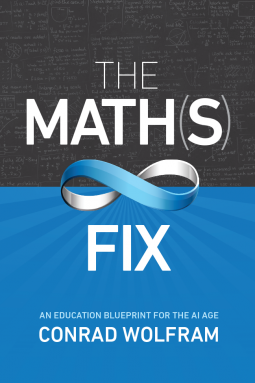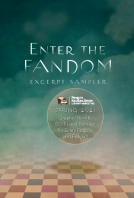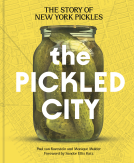
The Math(s) Fix: An Education Blueprint for the AI Age
by Conrad Wolfram
This title was previously available on NetGalley and is now archived.
Send NetGalley books directly to your Kindle or Kindle app
1
To read on a Kindle or Kindle app, please add kindle@netgalley.com as an approved email address to receive files in your Amazon account. Click here for step-by-step instructions.
2
Also find your Kindle email address within your Amazon account, and enter it here.
Pub Date Jun 10 2020 | Archive Date Sep 15 2020
Talking about this book? Use #theMathsFix #NetGalley. More hashtag tips!
Description
Why are we all taught maths for years of our lives? Does it really empower everyone?
Or fail most and disenfranchise many? Is it crucial for the AI age or an obsolete rite of passage?
The Math(s) Fix: An Education Blueprint for the AI Age is a groundbreaking book that exposes why maths education is in crisis worldwide and how the only fix is a fundamentally new mainstream subject. It argues that today’s maths education is not working to elevate society with modern computation, data science and AI. Instead, students are subjugated to compete with what computers do best, and lose.
This is the only book to explain why being “bad at maths” may be as much the subject’s fault as the learner’s: how a stuck educational ecosystem has students, parents, teachers, schools, employers and policymakers running in the wrong direction to catch up with real-world requirements. But it goes further too—for the first time setting out a completely alternative vision for a core computational school subject to fix the problem and seed more general reformation of education for the AI age.
Advance Praise
"Conrad Wolfram is one of the most important mathematical thinkers of our time. This book is packed with incredible ideas that could fundamentally change the mathematics experience for students across the world. The vision Conrad puts forward will allow students to experience mathematics as a beautiful, exciting subject empowering them to use critical and computational thinking, solving the problems they will encounter in their 21st-century work and lives."
—Jo Boaler, author of bestseller Mathematical Mindsets: Unleashing Students’ Potential through Creative Math, Inspiring Messages and Innovative Teaching
"I never enjoyed maths until Conrad taught me its beauty and how I could apply it to my passions. Traditionally taught in schools like a dead language, we spend years training to compete with machines. In an era of AI the machines will win unless we reimagine what maths can be, where present and future generations harness its power to solve our most important challenges. This book tells us how."
—Graham Brown-Martin, author and broadcaster, Learning {Re}imagined
"Maths is the weak link in every school. Progressive efforts at education reform are impossible without addressing this reality and offering a new diet of mathematics for children. [In this book] Conrad Wolfram makes an important contribution to this effort by making the case, not just for new pedagogical strategies, but also by sharing a vision of computationally rich mathematics experiences accessible to learners of all ages. Reinvent school maths and you change the world!"
—Gary Stager, educator and co-author of Invent To Learn: Making, Tinkering, and Engineering in the Classroom
"Many are convinced that computers have pushed school maths ever closer a cliff-edge falling into irrelevance. Almost uniquely, Conrad Wolfram’s book offers a bold move forward. Based on both his experience and insight, he encourages us to ‘jump into the unknown’ and move from teaching computing skills to promoting computational thinking. He has pioneered this concept and drawn a compelling roadmap to overcome the deadlock, giving our students truly empowering maths skills."
—Jaak Aaviksoo, former Minister of Education, Estonia
Available Editions
| ISBN | 9781579550301 |
| PRICE | |
Average rating from 11 members
Featured Reviews
I think that this is an important book for anyone involved in math(s) education to read. I have been thinking that the traditional math sequence can use some shaking up, and Wolfram really got my wheels turning. I am afraid that we are not leveraging technology as well as we can, and this book definitely supports that idea. Another key idea is that we are not supplying our students with skills that they can use in the 21st century, and I have heard many students complain that they cannot transfer the skills they learn in our classes into real-world use.
Wolfram prescribes, in detail, what he feels belongs in the new computation course. I’m not sure that I am on board with the entire list, but it is a great starting point. I think that data analysis and modeling are key skills for our students to possess. Some coding makes a lot of sense as well. The focus is on real-world, open-ended problems.
The question for me, which Wolfram addresses at great length, is why are we asking students to perform tasks that a computer can perform? Shouldn’t we be focused on generating our own problems? Shouldn’t we be focused on coming up with functions to model real data? Isn’t it more important that our students can identify problems that they want to solve and come up with efficient ways to solve them? I think this is what math(s) must transform itself to in order to be valuable to our students in the 21st century?
I give this book my strongest possible recommendation, and I encourage you to read it. And start discussions about what we want our ideal math(s) courses to look like.
Thank you to Wolfram Publishing and NetGalley for providing the advance review copy of this book to me for my honest opinion. (Fun fact: I had already pre ordered this book when I was approached to Wolfram for an advance copy. I liked the book so much that I did not cancel my print copy!)
The Math(s) Fix wants you to believe that computers are coming for your math.
Scary, isn’t it? You should find it scary. Computers are way better at calculating than we are, yet we insist that “real math” means learning how to do long division by hand!
Wolfram Media kindly provided me an eARC of this book via NetGalley in exchange for this review. I was definitely very interested in this.
Some positionality, because even though this review is not about me, my perspective informed my reaction to the book. I am a math and English teacher. I have taught high school in the UK, and I currently teach high school to adult students in Ontario who need their diploma. I have 7 years of intimate experience with how the math curriculum and our wider system of educating and assessing students fails them. My current position allows me a lot of latitude that I wouldn’t necessarily have if I had to answer to parents, so I’ve had the enjoyment of doing things like going gradeless. A lot of what Wolfram suggests in The Math(s) Fix aligns with what I am already doing or planning to do in my classroom—however, as he points out, teachers alone cannot implement this fix. For this reason, I am a proponent of radical change to all levels of our education system.
But what if you’re not? What if you’re someone who doesn’t know much about our current education system? You’ve been out of school for years. Maybe you’re a parent, maybe not. Will this book convince you that Wolfram is right, that there is a problem and he has the right solution? I hope so. I really hope so.
Here’s what you need to know about this book.
First, it’s not a math book. It’s not an education book. It’s not a policy book. There are no advanced equations in here. You don’t need anything beyond your basic education to read this. Wolfram also doesn’t delve too deeply into theory of pedagogy here (he brushes up against it, at times, but nothing that’s too hard to follow). Similarly, Wolfram keeps the aim of the book general enough, in terms of policy changes, to apply to any jurisdiction and any scale—local, regional, national. If you’re wondering, “Does this book apply to me, to my children, to my school, to my board or authority?” the answer is “Yes.”
Second, this is a book about the necessity of unity mathematics as a school subject with computational thinking, but it is not about how we should replace educators with computers, and if that’s the reading you take away from this, go back and read it again. I’ll admit I was skeptical as all-get-out when I saw who had written this. Indubitably Conrad Wolfram is qualified to speak on this subject, but would The Math(s) Fix just be a thinly-veiled advertisement for Wolfram products in schools? It’s unavoidable that Wolfram’s companies would benefit from the shift he outlines here, and he acknowledges this. Yet the arguments he makes for the necessity of this shift are persuasive and have nothing to do with the Wolfram bottom line. Moreover, Wolfram recognizes—indeed, is intimately familiar with—the limitations of computer-based math. At one point he condemns people who interpret calls for CBM to mean “computer-based assessments.” He argues that computers can help with the organization and presentation of material, that computers can help with computation, but that at the end of the day, both qualitative and quantitative assessments are best left to human educators. This is true even for quantitative assessments, because it is hard to quantify problem-solving. Which brings me to …
Third, this book clearly defines what math is and is not—or rather, what math has become in schools versus what it should be. One of the first things I say to my new math class full of anxious adult learners traumatized by their years of failing to do math in high school? “This,” I hold up my phone calculator, “is not math.” I proceed to explain how math is not “doing calculations,” because we have computers for that. I explain to them that real math is about creatively solving problems. And then I try, in eight weeks, 110 hours, to somehow undo as much of the years and years of abuse they’ve endured at the hands of our industrialized education system.
Don’t get me wrong: Ontario probably has one of the best math curricula out there. Yet I still want to tear it up and start fresh, because I think our whole approach is fundamentally backwards and obsolete in the world of computation.
Wolfram is very passionate about this change. He explains why this is not something we teachers can tackle alone. We need politicians, parents, and basically everyone else on board too—after all, this affects everyone. The Math(s) Fix is impeccably organized in such a way to lead you through the problem, the solution, and counterarguments to those who think this is unnecessary or unworkable.
What’s missing from The Math(s) Fix is probably a patina of prosaic writing. Wolfram admits he has shortcomings in this area. The arguments are logical, and the rhetoric itself isn’t bad. Yet despite his frequent references to experiences with his daughter, not to mention his own days learning defunct subjects like Latin, Wolfram is not great with the emotional appeals. As a reader, I definitely value these elements of a manifesto. There are others who have made similar arguments in more accessible, emotionally-intelligent ways. And there will hopefully be more to come. Wolfram himself acknowledges that this book cannot be the beginning nor the end of this movement for a new “core computational subject,” as he calls it.
So here’s my evaluation and my recommendation: The Math(s) Fix should be read by anyone with a strong interest in education policy, reform, or decision-making at any level. If you are a school board trustee, an educator, a politician … this book is for you. If you are a member of the general public and you feel like you have the stamina to wade through a book that is not at all math-heavy but definitely logic-encumbered then I’d recommend this book to you as well. If you want a book that makes a plea based more on anecdotes or broader social data, then you won’t find that here (and that’s ok). The Math(s) Fix is an important, well-presented addition to what is one of the most crucial conversations of our age. We are either going to get ahead of the computational revolution or we are going to do our children a disservice.
Will you contribute to the fix?
I was thrilled to be offered a copy of The Math(s) Fix for an honest review, and an invitation to the book launch webinar.
The book is great for anyone involved in education (parents, teachers, support staff, carers etc), but would highly recommend to those who dictate our curriculum. The whole concept is spot on, and voiced many of the reasons I decided my children would be educated otherwise. The Math(s) Fix also sets out a plan for how the subject should be; by teaching skills actually required of the real world, and "acknowledging computers exist". How long do you pressure a child to learn the violin, unless they desire a career as a performer? Why do certain job roles (usually the higher paying ones) require A's in outdated/irrelevant information? Definitely a conversation piece.
I do have one negative; this is painfully verbose. The subject itself involves complex terminology, for me, there was unnecessary padding.
The webinar was enjoyable, and seeing/hearing Conrad speak about and quote the book was great motivation.
The Math(s) Fix is a comprehensive densely informational book on the reformation and updating of mathematics education and teaching methods. Due out 10th June 2020 from Wolfram, it's 320 pages and will be available in hardcover, paperback, and ebook formats. It's worth noting that the ebook format has a handy interactive table of contents as well as interactive links and references throughout. I've really become enamored of ebooks with interactive formats lately. For Kindle Unlimited subscribers, this book is currently included in the KU subscription library to borrow and read for free.
Many educational teaching methods haven't changed a whole lot in hundreds of years. Outdated methods are slowly being replaced but change has been slow and often ineffective. Currently mathematics classes are being stripped to the bare minimum due to funding cuts as well as a lack of qualified and engaged teachers. The author makes the statement that without intervention, it wil become: "a backwater for a few afficianados, and drop out of the mainstream - a bit like the demise of Latin in UK or European schools".
Mathematics and logical reasoning skills are absolutely critical to our continued survival as a species. A basic understanding of math concepts is necessary for most other academic pursuits as well as teaching thinking patterns which provide tools for problem solving. As with most pursuits, having the proper tools available can mean the difference between success and failure.
Our past modality for teaching mathematics has proven inadequate for our current educational needs. The author makes a very good point for utilizing the tools available, including powerful computer assisted processing power, to structure mathematics education to reach more students and actually *teach* them, helping them build and own the problem solving tools instead of just using cookie-cutter tests to "cram - test - forget".
This is an intellectually dense textbook, written by an academic from a strong academic background. It's full of formal academic language and isn't an "easy" (read lazy) book to read. It's rigorous and demanding. He follows the premise in the introduction: define - abstract - compute - interpret, as a formula for the rest of the book.
At the end of the day, though it's somewhat oversimplified (and much more elegantly said in the 320 pages of the book: no teaching reform (however well meaning) has really taken into account the fact that computers exist. This book changes that.
For American readers, much of the spelling and language utilize the British standard spellings, so things like "maths", "utilise", "specialise", etc are chosen consequently. It shouldn't prove any difficulty in context.
We need a better way to teach mathematics. We need more people who understand mathematics to become engineers, physicists, scientist, and problem solvers. Wolfram has a lot of interesting ideas on that subject.
Five stars (readers should keep in mind that the subject requires some effort). I would enthusiastically recommend people in education or policy to expend the necessary effort.
Disclosure: I received an ARC at no cost from the author/publisher for review purposes.
Readers who liked this book also liked:
Silvia Moreno-Garcia
Historical Fiction, Literary Fiction, Sci Fi & Fantasy
Rachel Joyce
Historical Fiction, Literary Fiction, Women's Fiction
Brian Soonho Yoon
Children's Nonfiction, Crafts & Hobbies
Sam Morrison
Children's Nonfiction, Crafts & Hobbies, Outdoors & Nature


















